
Butyriboletus appendiculatus is an edible pored mushroom that grows under oaks and other broad leaved trees such as beech. It is commonly known as the butter bolete. It often grows in large colonies beneath the oak trees, and is frequently found cohabiting with old oaks in ancient woodland. It is relatively rare in Britain. Its stipe and pores are often bright yellow and its flesh stains bright blue when cut or bruised.

Butyriboletus regius, commonly known as the royal bolete or red-capped butter bolete, is a basidiomycete fungus of the genus Boletus found in China and Europe. B. regius has a pink cap, yellow flesh, and a reticulate pattern on the stem. Harry D. Thiers described a similar mushroom from California as B. regius, though it is not the same species. B. regius in Europe does not stain when exposed to air, or stains weakly, but the California species stains blue. Both European and California species are considered choice edibles.
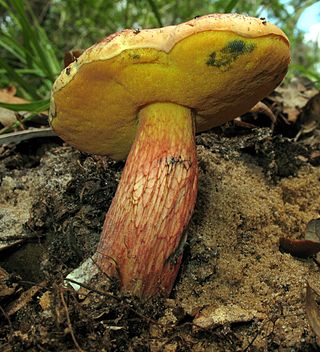
Exsudoporus floridanus is a species of edible bolete mushroom in the family Boletaceae. In 1945, American mycologist Rolf Singer described a species he found in Florida during his 1942–3 tenure of a Guggenheim Memorial Fellowship. He originally described it as a subspecies of the eastern North American species Boletus frostii, but later considered it worthy of distinct species status in a 1947 publication. Based on morphological and phylogenetic data, Vizzini and colleagues transferred this species to a newly described genus Exsudoporus in 2014. Due to lack of sufficient sequences, Wu et al. (2016) were reluctant to accept Exsudoporus and considered it a synonym of Butyriboletus, so they proposed a new combination Butyriboletus floridanus. However, following phylogenetic and morphological analyses clearly resolved Exsudoporus as a monophyletic, homogenous and independent genus that is sister to Butyriboletus.

Butyriboletus roseopurpureus is a species of fungus in the family Boletaceae. Found in eastern North America, it was officially described in 2000 as a species of Boletus, and transferred to the genus Butyriboletus in 2015.
Butyriboletus peckii is a fungus of the genus Butyriboletus native to eastern North America. It was first described by Charles Christopher Frost in 1878. Until 2014, it was known as Boletus peckii. Recent changes in the phylogenetic framework of the Boletaceae prompted the transfer of this species, along with several other related boletes, including Caloboletus calopus, to the genus Caloboletus. In 2015, Kuan Zhao and colleagues published analysis that demonstrated that the bolete belongs to Butyriboletus, closely related to Butyriboletus pulchriceps.

Butyriboletus is a genus of fungi in the family Boletaceae. The genus was circumscribed in 2014 by mycologists David Arora and Jonathan L. Frank to accommodate "butter bolete" species that were shown by molecular analysis to be phylogenetically distinct from Boletus. Butyriboletus contains 24 ectomycorrhizal species found in Asia, Europe, North America and north Africa.
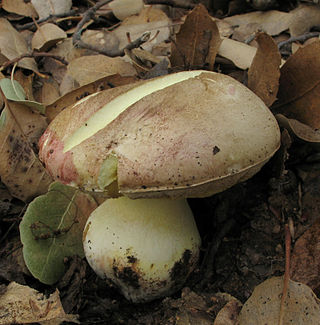
Butyriboletus querciregius is a pored mushroom in the genus Butyriboletus. Found in California, where it grows in a mycorrhizal association with coast live oak, it was described as new to science in 2014.
Butyriboletus roseoflavus is a pored mushroom in the genus Butyriboletus found in Asia. It was originally described in 2013 as a species of Boletus, but was transferred the following year to the newly created genus Butyriboletus.
Butyriboletus roseogriseus is a pored mushroom in the family Boletaceae found in Europe. It was originally described as a species of Boletus in 2014, but transferred later that year to the newly created genus Butyriboletus.
Butyriboletus sanicibus is a pored mushroom in the genus Butyriboletus. Found in China where it grows in association with Yunnan pine, it was described as a new species in 2014.
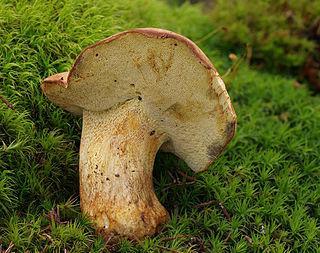
Butyriboletus subappendiculatus is a pored mushroom in the family Boletaceae. This European species was originally described as a species of Boletus in 1979, but later transferred to Butyriboletus in 2014. It is considered endangered in the Czech Republic.
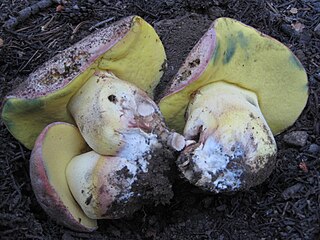
Butyriboletus abieticola is a pored mushroom in the family Boletaceae. It was originally described in 1975 by mycologist Harry Delbert Thiers as a species of Boletus, but transferred in 2014 to the newly created genus Butyriboletus.
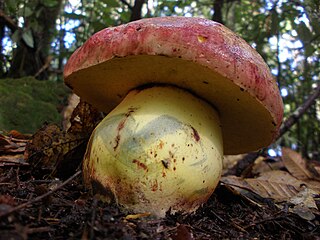
Butyriboletus autumniregius is a pored mushroom in the family Boletaceae. It is found in California, where it fruits under Douglas fir and redwood.

Butyriboletus brunneus is a pored mushroom in the family Boletaceae. This North American species was originally described by Charles Horton Peck in 1890 as a variety of Boletus speciosus.
Butyriboletus cepaeodoratus is a pored mushroom in the family Boletaceae. An Asian species, it was originally described in 2013 as a species of Boletus, but transferred to the newly created genus Butyriboletus the following year.
Butyriboletus ventricosus is a pored mushroom in the family Boletaceae. An Asian species, it was originally described in 2013 as a species of Boletus, but transferred to the newly created genus Butyriboletus the following year.

Butyriboletus fuscoroseus is a pored mushroom in the family Boletaceae. It was formerly considered a species of Boletus, but in 2014 was transferred to the newly created genus Butyriboletus. Boletus pseudoregius, a European taxon originally described as a subspecies of Boletus appendiculatus in 1927, is a synonym. B. fuscoroseus is considered critically endangered in the Czech Republic.
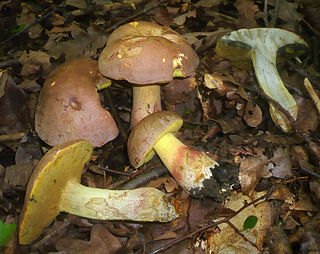
Butyriboletus fechtneri is a basidiomycete fungus in the family Boletaceae. It was formerly regarded as a species of Boletus, but in 2014 was transferred to the newly erected genus Butyriboletus, after molecular data revealed that it is a member of the "Regius" clade, quite distant from the core clade of B. edulis and closely allied species.
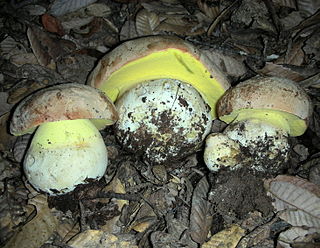
Butyriboletus persolidus is a pored mushroom in the family Boletaceae. Found in California, where it grows in a mycorrhizal association with coast live oak, it was described as new to science in 2014.

Butyriboletus primiregius is a pored mushroom in the family Boletaceae. Found in California, where it grows in a mycorrhizal association with fir, it was described as new to science in 2014.












